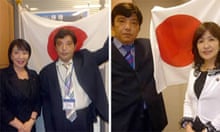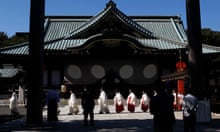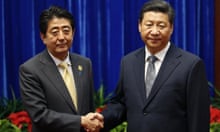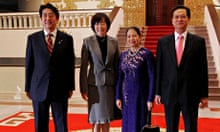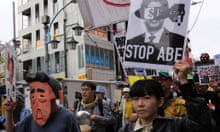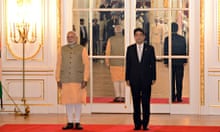Japan's prime minister, Shinzo Abe, has signalled a rare attempt to mend fences with China when he appointed two MPs considered friendly towards Beijing to two senior posts in his governing Liberal Democratic party (LDP).
The move was part of a major revamp of Abe's administration after a run of mixed economic data and an unpopular increase in the sales tax saw his popularity ratings drop to around 50%, compared to around 70% in the months after he took office in December 2012, vowing to kick-start the word's third-biggest economy.
In his first cabinet reshuffle on Wednesday, Abe also increased the number of female ministers to five – equaling a record set by his LDP predecessor, Junichiro Koizumi, in 2001 – as part of his programme to increase the number of women in the workforce, a key part of his long-term growth strategy.
His decision to appoint Sadakazu Tanigaki as LDP's secretary general, and veteran MP Toshihiro Nikai as his deputy, drew a moderately optimistic response from Beijing and raised hopes that the two neighbours could improve ties after two years of friction over ownership of the Senkaku islands, known as the Diaoyu in China.
Abe has angered Beijing with his revisionist views on Japan's wartime conduct and robust claims to the Senkakus, as well as a visit in December 2013 to a controversial war shrine regarded by China and South Korea as a symbol of Japanese militarism.
The appointment of two men known for their close ties to China could advance efforts to set up the first meeting between Abe and his Chinese counterpart, Xi Jinping, at the Apec (Asia-Pacific Economic Cooperation) summit in Beijing this autumn.
"He is sending a strong message to China that he wants to improve ties. Tanigaki and Nikai both have good ties with China," said political analyst Atsuo Ito.
The chief cabinet secretary, Yoshihide Suga, speaking as Chinese leaders attended a newly launched commemoration of Japan's wartime defeat, said the two countries had a shared responsibility to safeguard the region's peace and prosperity.
"It is vital to develop a forward-looking, cooperative relationship on common issues confronting international society," Suga told reporters after the reshuffle.
Chinese officials said they hoped the personnel changes would help ease tensions. "We hope that Abe's cabinet members will all be active promoters of the improvement and development of Sino-Japanese relations," foreign ministry spokesman Qin Gang told reporters.
Beijing will have been less pleased with Abe's choice of defence minister. Akinori Eto is a close Abe ally and member of a group of MPs who support visits by politicians to Yasukuni, a Shinto shrine in Tokyo that honours Japan's war dead, including 14 class-A war criminals.
Abe, a conservative who has raised defence spending to counter an increasingly assertive China, provoked outrage in Beijing and Seoul in December 2013 when he paid his respects at Yasukuni, although he has since stayed away.
Abe told an evening news conference that the economy remained his priority as the party debates to go ahead with a second rise in the sales tax.
He attempted to demonstrate his commitment to "womenomics" by filling five of the 18 cabinet posts with female lawmakers. His previous cabinet included only two women.
The move "should shield Abe from charges of hypocrisy," said Tobias Harris, an analyst at Teneo Intelligence in Washington. "However, the LDP still has a problem of having too few women ready to serve in government, and too many men who resent their advancement."
Women comprise 10% of MPs in Japan's parliament and less than 4% of board members of listed Japanese companies, compared with 12% in the US and 18% in France. Last year, the World Economic Forum ranked Japan 105th in its global gender gap report, a survey of economic equality and political participation.

